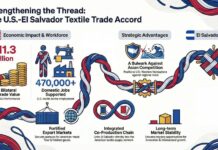Introduced by Senator Cindy Hyde-Smith (R-MS), the legislation is designed to enhance demand for domestically produced cotton and related products, including apparel, home textiles, and nonwovens.
To qualify, these items must be manufactured entirely in the United States, or if imported, they must be made fully or partially with US extra-long staple cotton or upland cotton.
The Buying American Cotton Act aims to leverage the traceability of US cotton alongside American consumers’ buying preferences.
The proposed tax credit would be available to the first US-based entity that directly sells an eligible product to a consumer within the United States. The credit amount would be determined by several factors, including verification of the product’s US origin, the percentage of US-grown cotton used, and where the product is manufactured.
Patrick Johnson, chairman of the National Cotton Council (NCC) and producer from Tunica, Mississippi, stated: “The Buying American Cotton Act is transformative for our industry. By capitalising on the traceability of US cotton and the purchasing power of American consumers, this bill will drive the preference for domestically produced cotton and cotton products. The transferable tax credits will encourage businesses to opt for US cotton, strengthening our agricultural sector and creating more jobs. I want to thank Senator Hyde-Smith for her foresight in introducing this legislation.”
The NCC also expressed appreciation to Senators John Boozman (R-AR), Katie Britt (R-AL), and Roger Marshall (R-KS) for their roles as co-sponsors of the bill, and they expect further co-sponsors to join soon.
Additionally, the report highlighted that children face a heightened risk from exposure to various chemicals, including heavy metals, PFAS, pesticides, and phthalates found in textiles, food products, and other consumer goods.
Due to their unique behaviors and developmental stages, children are particularly vulnerable to potential harm from these environmental hazards.

































